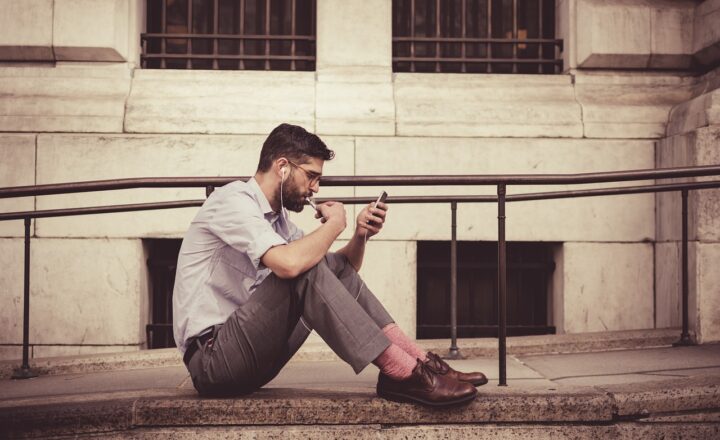How to Break Free from Social Media Addiction: Strategies for a Balanced Life
October 24, 2024

Social media has become an integral part of our lives, connecting us with friends, news, and entertainment. However, the same platforms that keep us connected can also contribute to unhealthy habits, leading to social media addiction. Scrolling endlessly, feeling anxious without your phone, or checking notifications obsessively are signs that social media might be taking over your life. In this article, we’ll explore strategies to break free from social media addiction and create a balanced, fulfilling life.
1. Recognizing the Signs of Social Media Addiction
Before you can break free from social media addiction, it’s important to recognize the signs. Many people don’t realize the extent to which social media controls their time and attention.
Common signs of social media addiction include:
- Feeling anxious or stressed when you can’t access social media.
- Spending more time on social platforms than intended.
- Constantly checking your phone for updates, even in social settings.
- Experiencing a decline in productivity or neglecting responsibilities.
- Feeling envious, lonely, or dissatisfied after using social media.
Once you identify these behaviors, you can start taking steps toward reducing your dependency.
2. Understand Why You’re Hooked
Social media platforms are designed to be addictive. They use notifications, likes, and comments to trigger the release of dopamine, the brain’s feel-good chemical. This reward system keeps users coming back for more.
Reasons why social media is addictive:
- Dopamine Hits: Every notification or like triggers a dopamine release, making us feel happy or validated.
- Fear of Missing Out (FOMO): Social media creates a constant feeling that we need to stay updated to avoid missing important information or events.
- Social Validation: Many users seek likes and comments as a form of validation and social approval.
By understanding the psychological mechanisms behind social media addiction, you can better equip yourself to break free from its hold.
3. Set Clear Boundaries
One of the most effective ways to regain control over your social media usage is to set clear boundaries. This means consciously limiting the time you spend on these platforms and finding healthier alternatives for connecting with others.
How to set boundaries with social media:
- Time Limits: Set daily or weekly limits on how much time you can spend on social media. Apps like Screen Time (iOS) or Digital Wellbeing (Android) can help monitor your usage.
- Scheduled Social Media Breaks: Plan specific times during the day when you allow yourself to check social media, and avoid it at all other times.
- No Phone Zones: Create ‘phone-free’ zones, such as the bedroom or dining table, to prevent mindless scrolling during meals or before bed.
Establishing these boundaries helps you regain control of your time and focus.
4. Detox: Take a Break from Social Media
Sometimes the best way to break free from social media addiction is to take a complete break. A social media detox allows you to reset your habits and evaluate your relationship with these platforms.
Steps for a successful social media detox:
- Start Small: Begin with a 24-hour break and gradually increase the length of your detox as you feel more comfortable.
- Inform Your Circle: Let friends and family know you’re taking a break so they don’t feel ignored and understand why you’re offline.
- Fill the Void: Replace social media time with other activities like reading, exercising, or spending time with loved ones.
A social media detox can help you reset your priorities and find joy in offline activities.
5. Reassess Your Social Media Goals
Not all social media usage is harmful. In fact, these platforms can be useful for staying connected, promoting your work, or learning new skills. The key is to reassess why you’re using social media and to set healthy goals.
Questions to ask yourself:
- Why do I use social media? Are you using it for work, entertainment, or to stay connected?
- Is it adding value to my life? Does your social media usage contribute to your personal or professional goals?
- Can I reduce my usage without losing value? Are there ways to streamline your social media time without missing out on the benefits?
By understanding your motivations, you can adjust your usage to be more intentional and less addictive.
6. Find Healthier Alternatives
Social media often fills a gap in our lives—whether it’s boredom, loneliness, or the need for validation. To break free from addiction, it’s important to find healthier alternatives to meet these needs.
Ideas for healthier alternatives:
- In-Person Socializing: Make time for face-to-face interactions with friends and family instead of virtual ones.
- Hobbies: Pick up a new hobby, whether it’s painting, hiking, or cooking, to occupy your time and engage your mind.
- Physical Activity: Exercise releases endorphins, the body’s natural feel-good chemicals, which can replace the dopamine hits from social media.
Finding offline activities that fulfill your emotional and social needs can reduce the urge to turn to social media.
7. Curate Your Feed
If quitting social media entirely isn’t feasible, consider curating your feed to make your experience more positive. Follow accounts that inspire and motivate you, and unfollow or mute accounts that bring negativity or cause unnecessary comparison.
How to curate a healthier social media feed:
- Unfollow or Mute: Remove accounts that make you feel envious, stressed, or overwhelmed.
- Follow Positive Influencers: Seek out accounts that promote positivity, wellness, and self-improvement.
- Limit News Exposure: If constant news updates are causing anxiety, reduce your consumption by following only trusted news sources and checking updates less frequently.
Curating your feed allows you to control the type of content you consume, making social media a more positive experience.
8. Seek Professional Help If Needed
For some individuals, social media addiction may be more serious and require professional intervention. If you find it difficult to control your usage despite multiple attempts, or if it’s severely impacting your life, seeking help from a mental health professional may be beneficial.
When to seek professional help:
- Severe Anxiety or Depression: If your social media use is leading to mental health issues, therapy or counseling can help address the underlying causes.
- Inability to Disconnect: If you feel powerless to reduce your social media usage despite negative consequences, a therapist can help you develop healthier coping mechanisms.
- Disrupted Relationships or Work: If social media is interfering with your personal or professional life, it’s time to seek outside support.
Professional help can provide you with the tools and strategies needed to overcome social media addiction.
Conclusion: Regaining Control and Balance
Breaking free from social media addiction is a challenging but worthwhile endeavor. By recognizing the signs, setting clear boundaries, taking breaks, and finding healthier alternatives, you can regain control of your time and mental well-being. Remember, social media can be a useful tool, but it should never dominate your life. With conscious effort and intentional changes, you can create a balanced relationship with social media that enhances your life rather than detracting from it.







